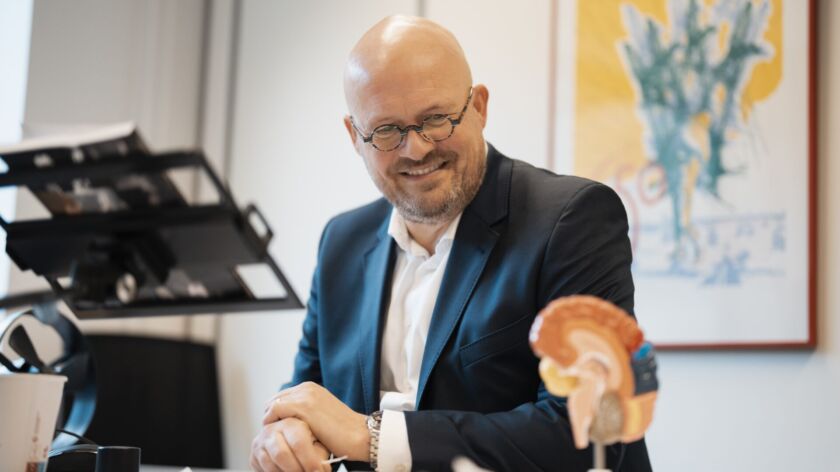Professor and critic of woke culture Frank Hartmann continues his career in the United States
-
 Frank Hartmann. Foto: Johannes Fiebig
Frank Hartmann. Foto: Johannes Fiebig
This summer, Professor Frank Hartmann is exchanging Radboud University for Northeastern University in Boston. The Professor of Accounting, who is also a philosopher, has in recent years vehemently criticised the woke movement and his fellow academics' defensive reflex to the budget cuts from The Hague.
‘Universities are facing some major challenges’, says Frank Hartmann. ‘What is needed to meet them is a lot of debate, the willingness to step off the beaten path, a critical reevaluation of the overblown publishing culture, and the reassessment of academic values.’
That is precisely what Hartmann is going to be busying himself with, he says. In the United States, that is; he is transferring to Northeastern University. He will be joining the university in Massachusetts on 1 July.
‘But as with all privileges, you must always be careful not to take them for granted’
‘After completing my second PhD thesis, in which I tried to explore more fundamentally my own field of accounting in relation to practice, I could no longer ignore my interest in neuroscience, AI, and even theology’, says Hartmann. ‘At my new research chair, I get all the freedom to delve into these kinds of topics. After all, America is and remains the Valhalla for accounting researchers.’
You have been fiercely criticised by your colleagues in recent years for your positions on the woke movement, budget cuts, and campus activism, among other things. Did you still feel welcome at Radboud University?
‘Well, I didn’t find those reactions particularly strong – in fact, that was what I found so worrisome. I would like academics, even when I disagree with them, to surprise me intellectually with something new, a fresh or funny insight, but it is always predictable, pedantic, collective, ad hominem, and all in all not very enriching.’
What bothered you the most?
‘Radboud University has the most beautiful campus in the Netherlands and is located in one of the nicest cities to live and work. That is a great privilege. But as with all privileges, you must always be careful not to take them for granted. After all, the world is much bigger than Nijmegen, and an academic institution cannot afford to ignore the norms and values raging around the world.’
What are you referring to?
‘It is striking how academics are now pointing to politicians and society, without any nuance and self-criticism, as threats to their academic privileges. Are we living in such a strong bubble? Could it be that politicians and society have a slightly different perspective on what is happening at the university? Time to wake-up, I would say!’
You think universities should be more responsive to politics?
‘Of course – we are paid by taxpayers, but they are not allowed to read our magazines unless they pay for them. They should just shut up because we always know better. Meanwhile, the universities mostly appear in the news with protests against budget cuts, violence on campus, and ideologies about the environment, meat-eating, gender, and I know not what. If we want to be critical thinkers, a certain degree of self-criticism is a must.’
Universities could well do with less?
‘Financially, universities are very hungry caterpillars. It is complete nonsense that everyone is doing amazing research and that social disasters will strike if our budgets shrink a bit. I was surprised by the lack of nuance in the reactions to the budget cuts in the Netherlands. As if universities have some kind of societal immunity. But no one dares to say such things.’
Does the financial crisis at the School of Management also play a role in your decision to leave? In an earlier interview, you expressed strong concerns about the future of the Faculty.
‘The concerns I expressed are widely shared, but hardly anyone dared to come forward and speak up. I think anyone would prefer to work in a financially and managerially well-run organisation. I know I do.’
Is academic freedom better off in the US, now that Trump and others are ranting against Harvard?
‘Academic freedom should not be confused with the freedom to express a particular left-wing or right-wing political belief. It is an academic mortal sin to believe that only people of a certain political persuasion should be able to claim academic freedom. Incidentally, protesting, whether for or against societal developments, has little to do with academic freedom. Academic freedom does not mean scientists can just do or say anything.’
‘Fortunately, you can now see counter-movements emerging – especially in the United States’
‘I advocate for intellectual activism as a core aspect of the university. This also means that we should not reduce professors to project managers who mould a popular societal problem into a subsidised project. To me, that is not academic leadership. But, of course, this is not just an issue at Radboud University. Fortunately, you can now see counter-movements emerging – especially in the United States, where professors are once again being given the freedom to freely do their academic work.’
How will you look back on your time in Nijmegen in a few years, do you think?
‘Looking at all the disciplines Nijmegen has can only make you very happy. I think there is no university in the world where there is literally only a very short bridge separating management scientists from analytic philosophers. I have crossed that bridge many times and I think back to it with the greatest pleasure. The Nijmegen philosophers are far too modest. They are a hugely important pillar of this university.’




